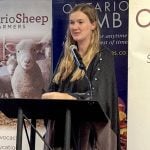John Gilleard is taking action to combat parasite resistance to a popular cattle deworming treatment.
Gilleard, a professor of parasitology and associate dean of research at the University of Calgary faculty of veterinary medicine, is studying insect resistance to ivermectin, a pour-on livestock product.
Researchers have already observed resistance to the treatment among several common parasites.
Using DNA sequencing, Gilleard’s first task is to identify the types of eggs in fecal samples and determine what percentage are resistant.
Gilleard will also determine whether parasite larvae survive Canadian winters.
Read Also

Lending policy still focused on primary producers: Farm Credit Canada
Farm Credit Canada said it has not changed its business practices and remains committed to supporting all producers, after a report from an Ottawa-based media outlet claimed otherwise.
“We need to know this because this will give an answer to when’s the best time to treat. If we don’t know if they can live, it’s difficult to give precise information about when’s the best time to treat,” said Gilleard.
A solution to parasite resistance remains on the horizon, but Gilleard said a process called refugia might be part of the answer.
This practice, widely used by sheep producers in Europe and the United States, involves treating 70 to 80 percent of a herd and leaving the rest untreated.
The result is a diluted population of resistant insects.
“It’s difficult to tell a producer, ‘you’re going to get production gains, but leave 20 percent of your animals untreated,’ ” said Gilleard.
“They’ll think ‘why would I do that? I’m going to lose money.’ So it’s a really complicated argument.”
However, Gilleard said he believes producers should seriously consider the practice as part of the battle against resistance.














